Related Research Articles
In the United States, a state supreme court is the highest court in the state judiciary of a U.S. state. On matters of state law, the judgment of a state supreme court is considered final and binding in both state and federal courts.

The Massachusetts Supreme Judicial Court (SJC) is the highest court in the Commonwealth of Massachusetts. Although the claim is disputed by the Supreme Court of Pennsylvania, the SJC claims the distinction of being the oldest continuously functioning appellate court in the Americas, with a recognized history dating to the establishment of the Massachusetts Superior Court of Judicature in 1692 under the charter of the Province of Massachusetts Bay.
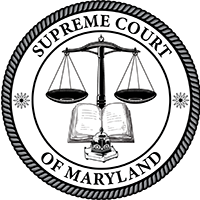
The Supreme Court of Maryland is the highest court of the U.S. state of Maryland. The court, which is composed of one chief justice and six associate justices, meets in the Robert C. Murphy Courts of Appeal Building in the state capital, Annapolis. The term of the Court begins the second Monday of September. The Court is unique among American courts in that the justices wear red robes.

The government of Maryland is conducted according to the Maryland Constitution. The United States is a federation; consequently, the government of Maryland, like the other 49 state governments, has exclusive authority over matters that lie entirely within the state's borders, except as limited by the Constitution of the United States.
The Alaska Court System is the unified, centrally administered, and totally state-funded judicial system for the state of Alaska. The Alaska District Courts are the primary misdemeanor trial courts, the Alaska Superior Courts are the primary felony trial courts, and the Alaska Supreme Court and the Alaska Court of Appeals are the primary appellate courts. The chief justice of the Alaska Supreme Court is the administrative head of the Alaska Court System.

The government of the U.S. State of Oklahoma, established by the Oklahoma Constitution, is a republican democracy modeled after the federal government of the United States. The state government has three branches: the executive, legislative, and judicial. Through a system of separation of powers or "checks and balances," each of these branches has some authority to act on its own, some authority to regulate the other two branches, and has some of its own authority, in turn, regulated by the other branches.

The Massachusetts Appeals Court is the intermediate appellate court of Massachusetts. It was created in 1972 as a court of general appellate jurisdiction. The court is located at the John Adams Courthouse at Pemberton Square in Boston, the same building which houses the Supreme Judicial Court and the Social Law Library.
John M. Greaney is a former Associate Justice of the Massachusetts Supreme Judicial Court and former Chief Justice of the Massachusetts Appeals Court. After his judicial retirement, he served as Director of the Macaronis Institute for Trial and Appellate Advocacy at Suffolk University Law School. He currently is in private practice as senior counsel at Bulkley Richardson in Springfield, Massachusetts.
The Commonwealth of Massachusetts is governed by a set of political tenets laid down in its state constitution. Legislative power is held by the bicameral General Court, which is composed of the Senate and House of Representatives. The governor exercises executive power with other independently elected officers: the Attorney General, Secretary of the Commonwealth, and Auditor. The state's judicial power rests in the Supreme Judicial Court, which manages its court system. Cities and towns act through local governmental bodies to the extent that they are authorized by the Commonwealth on local issues, including limited home-rule authority. Although most county governments were abolished during the 1990s and 2000s, a handful remain.

The Boston Municipal Court (BMC), officially the Boston Municipal Court Department of the Trial Court, is a department of the Trial Court of the Commonwealth of Massachusetts, United States. The court hears criminal, civil, mental health, restraining orders, and other types of cases. The court also has an appellate division which reviews questions of law that arise from civil matters filed in the eight divisions of the department.

Ralph D. Gants was an American attorney and jurist who served as the chief justice of the Massachusetts Supreme Judicial Court. He was sworn in on July 28, 2014. Gants had previously served as an Assistant United States Attorney.
The Judiciary of California or the Judicial Branch of California is defined under the California Constitution as holding the judicial power of the state of California which is vested in the Supreme Court, the Courts of Appeal and the Superior Courts. The judiciary has a hierarchical structure with the California Supreme Court at the top, California Courts of Appeal as the primary appellate courts, and the California Superior Courts as the primary trial courts.
Geraldine S. Hines is an American retired judge who formerly served served as an associate justice of the Massachusetts Supreme Judicial Court from 2014 to 2017. She was nominated in July 2014 by Massachusetts Governor Deval Patrick and confirmed by an 8–0 vote of the Governor's Council. She succeeded Ralph D. Gants, who was promoted to chief justice.
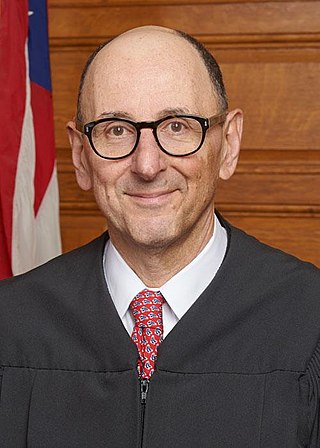
Judge Peter W. Agnes Jr. is a former justice of the Massachusetts Appeals Court as an Associate Justice, having been appointed by Governor Deval Patrick in 2011 and serving until reaching the mandatory retirement age of 70 in 2020. In addition to being an active member of the legal community in providing "…service on numerous Supreme Judicial Court and Bar Association committees, commissions[,]…task forces, [et al.]…," Justice Agnes has also been passionate about education, having taught at the Massachusetts School of Law for the past fifteen years, and continuing to do so currently. Agnes presently resides in Wayland, MA with his wife Eileen Agnes. They have four children and three grandchildren, boasting a passionate relationship with their extensive family outside of their legal careers.
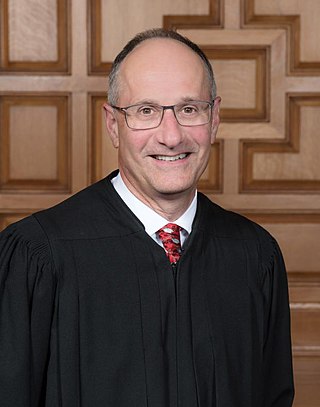
Scott Lewis Kafker is an associate justice of the Supreme Judicial Court of Massachusetts and the former Chief Justice of the Massachusetts Appeals Court.
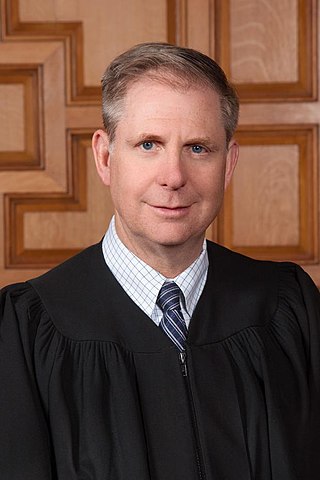
David A. Lowy is an American attorney, academic and jurist who served as an associate justice of the Supreme Judicial Court of Massachusetts from 2016 to 2024. In February 2024 Lowy was named general counsel for the University of Massachusetts.

Kimberly S. Budd is the chief justice of the Supreme Judicial Court of Massachusetts and former justice of the Massachusetts Superior Court.
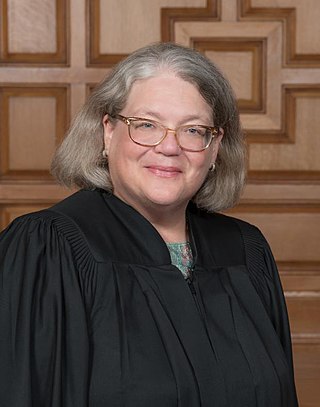
Elspeth B. Cypher is a former justice of the Supreme Judicial Court of Massachusetts who served from 2017 to 2024. She is also a former justice of the Massachusetts Appeals Court, where she served from 2000 to 2017.

Dalila Argaez Wendlandt is an American lawyer who has served as an associate justice of the Massachusetts Supreme Judicial Court since 2020. She previously served as an associate justice of the Massachusetts Appeals Court from 2017 to 2020.

Elizabeth Napier "Bessie" Dewar is an American lawyer who has served as an associate justice of the Massachusetts Supreme Judicial Court since 2024. She previously served as the state solicitor of Massachusetts from 2016 to 2024. Prior to serving as the state solicitor, she had served as the assistant state solicitor under former state solicitor Peter Sacks.
References
- ↑ "General Law - Part I, Title VII, Chapter 40U, Section 6". malegislature.gov. Retrieved 2024-06-08.
- ↑ Adopting MGL 40U: Municipal Hearing Officer Systems. Fitchburg Community Development and Planning Department Inspectional Services.
- ↑ "Summary of duties for a Justice of the Peace". Mass.gov.
- ↑ "Court of General Sessions of the Peace (1692-1827)". Mass.gov.
- ↑ "General Law - Part I, Title VII, Chapter 49, Section 35". malegislature.gov. Retrieved 2024-06-08.
- ↑ "General Law - Part I, Title VII, Chapter 49, Section 36". malegislature.gov. Retrieved 2024-06-08.
- ↑ "General Law - Part III, Title VI, Chapter 262, Section 34". malegislature.gov. Retrieved 2024-06-08.
- ↑ Wallack, Todd (12 April 2015). "Massachusetts courts' long-delayed computer system may leave public out". The Boston Globe .
- ↑ "Civil Procedure Research Guide". Northeastern University School of Law . Retrieved 11 June 2014.
- 1 2 "Massachusetts Law". Massachusetts. Retrieved 12 June 2014.
- ↑ "The Massachusetts Law Reporter". Connecticut Law Book Company. Retrieved 11 June 2014.
- 1 2 3 How a judge is selected in Massachusetts, Massachusetts Law Updates, Massachusetts Trial Court Law Libraries (August 21, 2018).
- ↑ David Boeri, [Newly Feisty Governor's Council Has A Shaky History], WBUR (April 27, 2011).
- ↑ Colleen Quinn & Michael Norton, Governor's Council rejects another Patrick nominee for judge, Patriot-Ledger (August 1, 2013).
- ↑ Alva C. Goldberg, Men who Lost the Presidency: Profiles of the 29 Men who Lost Elections to be President of the United States (J.M. Press: 1992), p. 361.
- 1 2 3 Wheeler Cowperthwaite, Sunshine Week: Nominating state’s judges starts in the dark, Cape Code Times (March 15, 2019).
- ↑ Jeffrey Rosen, Boston Legal, New Republic (October 26, 2011).
- 1 2 Gary V. Murray, Staying on the bench, Telegram & Gazette (July 12, 2010).
- ↑ "Associate Justice David A. Rose | Mass.gov". www.mass.gov. Retrieved 2021-01-01.
- ↑ Shira Schoenberg, Judge Thomas Estes 'can never command the moral authority' to be a judge, lawyer tells Massachusetts SJC, The Republican (April 24, 2018).
- ↑ Jim Russell, Massachusetts Judge Thomas Estes resigns after admitting to having sex in his chambers with drug court clinician, The Republican (May 25, 2018).
- ↑ Katie Lannan, Mass. Judicial Conduct Commission Weighs Possible Removal of Judge, State House News Service (October 5, 2020).
- ↑ "The Massachusetts Court System Intro". mass.gov. Archived from the original on August 8, 2010. Retrieved 2010-12-16.
- ↑ "The Massachusetts Court System Structure" (PDF). mass.gov. Archived from the original (PDF) on 2012-03-10. Retrieved 2010-12-16.